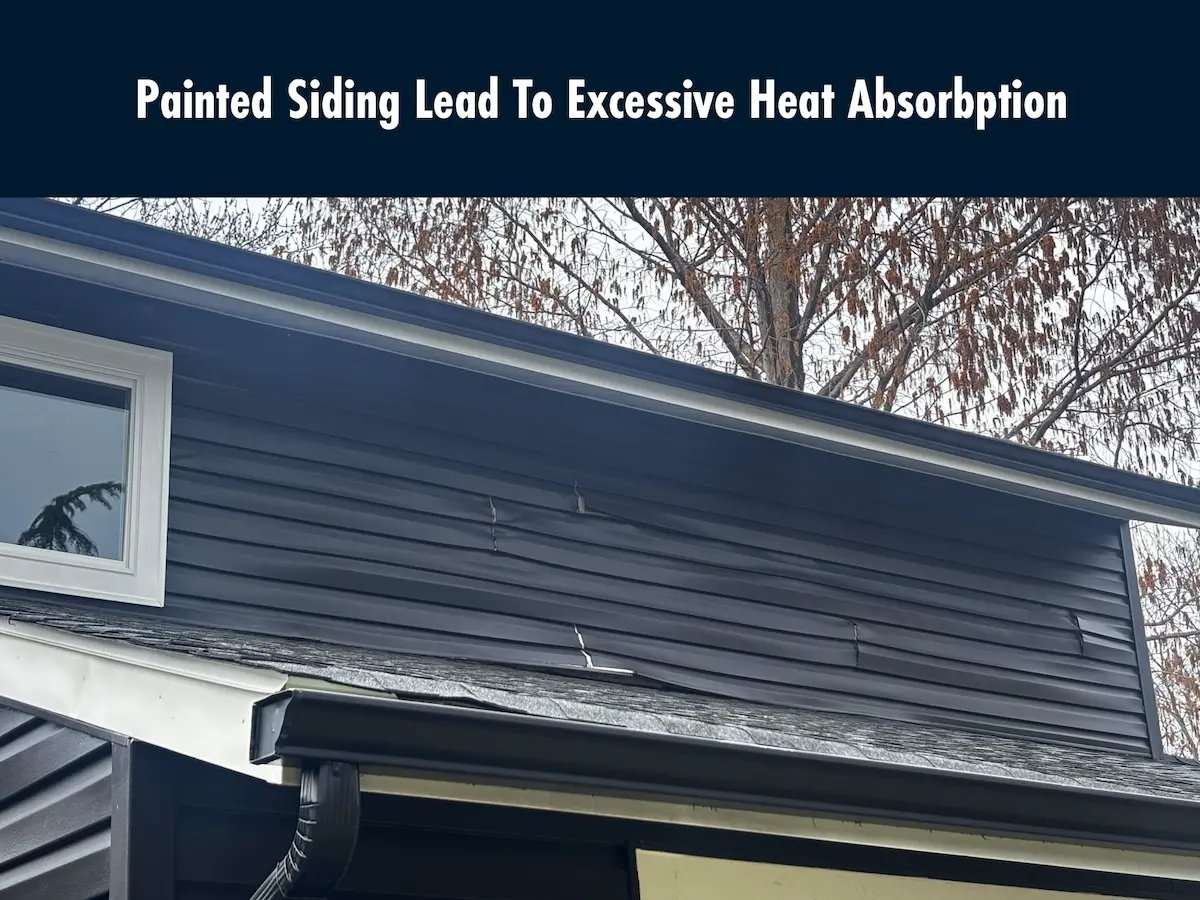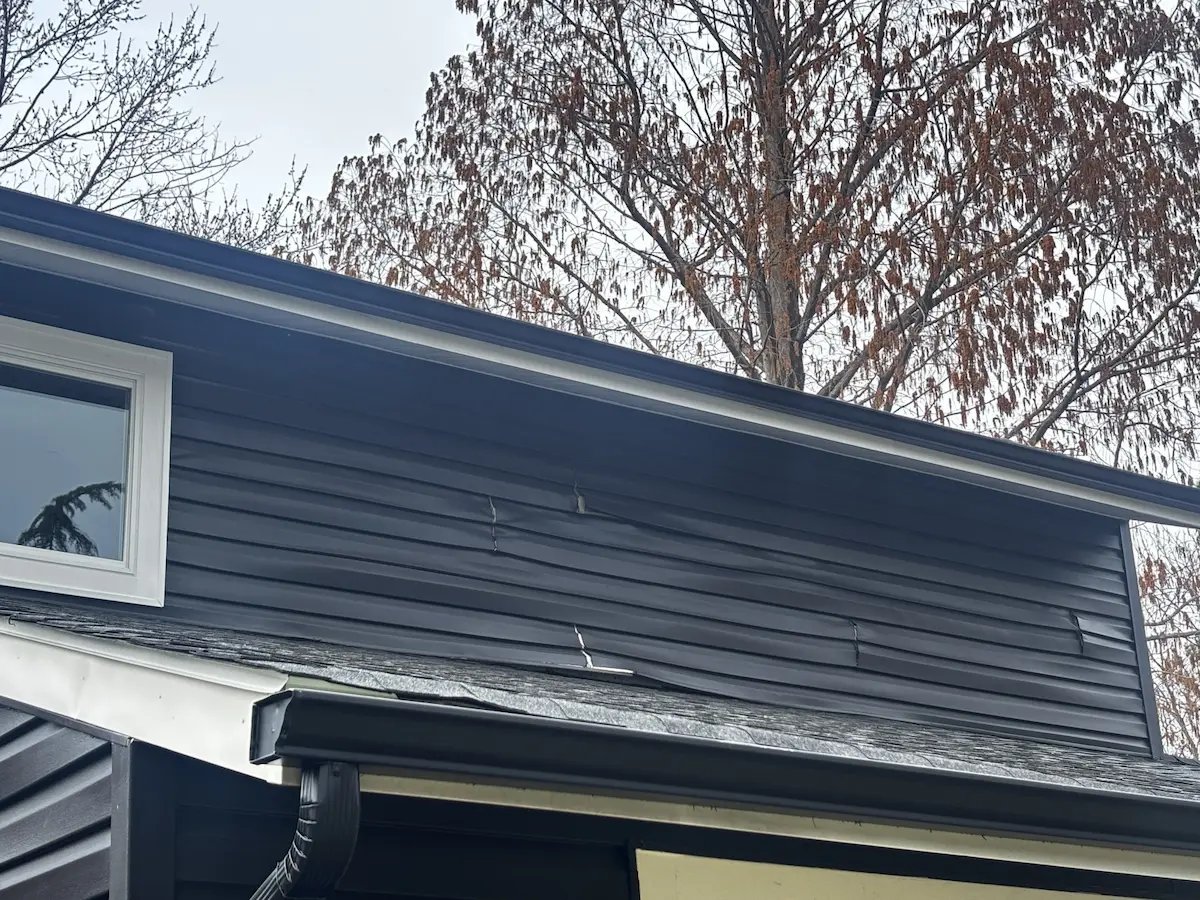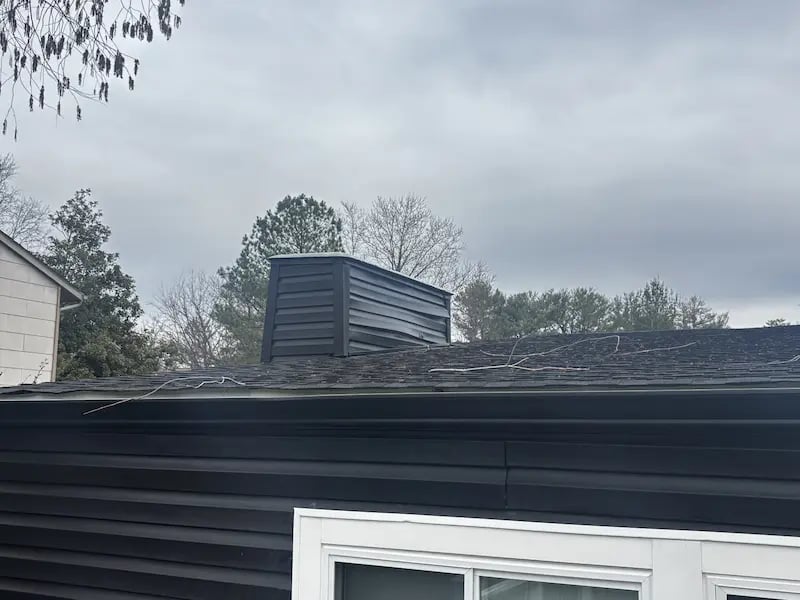Serving MD, DC & VA
Can You Paint Vinyl Siding? Why It’s a Bad Idea (Especially with Dark Colors)

Can You Paint Vinyl Siding? Why It's a Costly Mistake—Especially with Dark Colors
Painting vinyl siding is a tempting shortcut for homeowners looking to update their home’s exterior on a budget and enhance their home's curb appeal. But if you’re thinking about giving your house a fresh coat of paint—especially in a dark color—using exterior paint to refresh your home's exterior—you may want to think twice.
We recently worked on a vinyl sided home in Bowie MD where the owner applied new paint to their aging siding, which was not in good shape, choosing a trendy charcoal gray. While regular maintenance or painting might seem like a way of saving money, it can backfire if the siding isn't suitable for repainting. Within a year, the siding began to warp, buckle, and crack—resulting in a complete replacement that cost far more than if they had installed new siding in the first place.
Here’s why painting vinyl siding can cause permanent damage, and how modern siding is designed to prevent exactly that.

The Temptation to Paint Vinyl Siding
For many homeowners, the idea of painting vinyl siding is an attractive shortcut to boost curb appeal and refresh a tired exterior without the hefty price tag of replacing the siding. Vinyl siding is known for its durability and low maintenance, but over time, even the best materials can fade, discolor, or show signs of wear. When this happens, painting vinyl siding can seem like a cost-effective way to restore your home’s appearance and extend the life of your siding. However, before you grab a paintbrush, it’s essential to understand what’s involved in the painting process, the right materials to use, and the potential challenges you might face. While painting can be a budget-friendly option, it’s not always the best solution for every home or situation. Knowing the facts can help you make an informed decision about whether painting or replacing your vinyl siding is the right move for your home’s exterior and long-term maintenance costs.
⚠️ Why Painting Vinyl Siding—Especially in Dark Colors—Causes Damage
Many homeowners search for:
- “Can I paint vinyl siding a dark color?”
- “Is painting siding cheaper than replacing it?”
- “Why is my siding warping after painting?”
The answer: vinyl siding wasn’t designed to be painted, especially not with colors that absorb heat. Here’s what happens: When you paint vinyl siding, especially with dark colors, the material absorbs more heat, which can lead to warping and buckling. Vinyl siding expands and contracts with temperature changes, making it highly sensitive to climate conditions. This means that painting during periods of mild temperatures, low humidity, and dry weather is ideal, but these conditions are often unpredictable. Attempting to paint in late fall or early spring can be especially risky due to fluctuating climate conditions that affect how vinyl siding expands and contracts.
Proper surface prep is crucial—ensure all surfaces are thoroughly cleaned, and that you are working with a clean, non porous surface to promote paint adhesion and prevent peeling. Before painting, it’s important to cover and protect other surfaces, such as windows, trim, brick, and landscaping, to prevent overspray and damage. Different siding materials may react differently to paint, so always check compatibility.
When painting, always use vinyl safe paint and high quality paint for better durability, but even then, issues like peeling or fading can still occur over time. The first coat should be applied as a light, even layer to ensure smooth coverage and minimize the risk of future problems. Ongoing maintenance tips are necessary to prolong the life of painted siding and address any issues that arise.
🔥 Dark Paint Traps Heat
Darker colors absorb more sunlight. When you apply dark paint to old siding, it traps heat against the surface, causing the vinyl to expand beyond its intended limits. This results in warping, rippling, and buckling.
Using light, reflective paint colors can help reduce heat absorption and minimize the risk of warping.
🧪 No UV Protection = Faster Failure
Modern siding products are built with UV-reflective coatings that help manage heat and prevent fading. Old siding that's painted doesn't have these layers—so the material overheats and breaks down faster under sunlight.
🧱 Paint Can Restrict Movement
Vinyl siding is meant to expand and contract with temperature changes. When painted—especially with multiple coats—its flexibility is compromised. This leads to cracks, peeling, or splitting, especially at the seams.

The Painting Process Explained: More Trouble Than You Think
Painting vinyl siding isn’t as simple as slapping on a fresh coat and calling it a day. The process requires careful preparation and attention to detail to ensure the paint job lasts and actually improves your home’s curb appeal. First, the siding must be thoroughly cleaned—removing all dirt, mildew, and chalky residue is essential for proper adhesion. Any damaged areas, such as cracks or holes, need to be repaired before you even think about applying primer or paint. Once the surface is cleaned and prepped, choosing the right paint and primer is crucial; not all products are suitable for vinyl siding, and using the wrong ones can lead to peeling or poor coverage. Application techniques matter, too—using a soft brush or sprayer, applying thin, even coats, and allowing each coat to dry fully before adding a second coat are all key steps. Skipping or rushing any part of this process can result in a paint job that looks uneven, peels prematurely, or fails to protect your siding. While a properly prepared and executed paint job can enhance your home’s appearance, the process is more involved—and riskier—than many homeowners realize.
Choosing the Right Exterior Paints: Not as Simple as It Sounds
Selecting the right exterior paints for vinyl siding is a critical step that can make or break your paint job. Not all paints are created equal, and using the wrong type can lead to poor adhesion, premature fading, or even damage to your siding. For the best results, you’ll need a high-quality, 100% acrylic latex paint specifically formulated for vinyl siding. These paints are designed to flex with the material and withstand the elements, offering better durability and long-term performance. When it comes to paint color, it’s important to choose shades that are similar to or lighter than the original siding color—darker colors absorb more heat, which can cause the vinyl to warp or buckle. Trusted brands like Benjamin Moore and Sherwin-Williams offer exterior paints that are well-suited for vinyl siding, with a wide range of colors and finishes to match your home’s style. Taking the time to select the right paint and color will help ensure your painted vinyl siding looks great and stands up to the test of time.
Maintaining Your Painted Siding: The Hidden Ongoing Costs
Once your vinyl siding has been painted, the work doesn’t stop there. Painted vinyl siding requires regular upkeep to maintain its appearance and protect your investment. This means periodic cleaning to remove dirt, mildew, and other debris that can dull the finish or cause adhesion issues. It’s also important to inspect your siding regularly for signs of peeling, cracking, or fading, and to address any problems promptly with touch-ups or repairs. Environmental factors like harsh sunlight, extreme temperatures, and moisture can all take a toll on the paint’s durability, making ongoing maintenance essential for preserving the life of your paint job. While painting vinyl siding can initially seem like a cost-effective way to update your home’s exterior, the hidden costs of regular upkeep, cleaning, and touch-ups can add up over time. Before deciding to paint, consider whether you’re prepared for the commitment required to keep your painted vinyl siding looking its best year after year.
The Painting Process Explained: More Trouble Than You Think
Painting vinyl siding isn’t as simple as slapping on a fresh coat and calling it a day. The process requires careful preparation and attention to detail to ensure the paint job lasts and actually improves your home’s curb appeal. First, the siding must be thoroughly cleaned—removing all dirt, mildew, and chalky residue is essential for proper adhesion. Any damaged areas, such as cracks or holes, need to be repaired before you even think about applying primer or paint. Once the surface is cleaned and prepped, choosing the right paint and primer is crucial; not all products are suitable for vinyl siding, and using the wrong ones can lead to peeling or poor coverage. Application techniques matter, too—using a soft brush or sprayer, applying thin, even coats, and allowing each coat to dry fully before adding a second coat are all key steps. Skipping or rushing any part of this process can result in a paint job that looks uneven, peels prematurely, or fails to protect your siding. While a properly prepared and executed paint job can enhance your home’s appearance, the process is more involved—and riskier—than many homeowners realize.
Choosing the Right Exterior Paints: Not as Simple as It Sounds
Selecting the right exterior paints for vinyl siding is a critical step that can make or break your paint job. Not all paints are created equal, and using the wrong type can lead to poor adhesion, premature fading, or even damage to your siding. For the best results, you’ll need a high-quality, 100% acrylic latex paint specifically formulated for vinyl siding. These paints are designed to flex with the material and withstand the elements, offering better durability and long-term performance. When it comes to paint color, it’s important to choose shades that are similar to or lighter than the original siding color—darker colors absorb more heat, which can cause the vinyl to warp or buckle. Trusted brands like Benjamin Moore and Sherwin-Williams offer exterior paints that are well-suited for vinyl siding, with a wide range of colors and finishes to match your home’s style. Taking the time to select the right paint and color will help ensure your painted vinyl siding looks great and stands up to the test of time.
Maintaining Your Painted Siding: The Hidden Ongoing Costs
Once your vinyl siding has been painted, the work doesn’t stop there. Painted vinyl siding requires regular upkeep to maintain its appearance and protect your investment. This means periodic cleaning to remove dirt, mildew, and other debris that can dull the finish or cause adhesion issues. It’s also important to inspect your siding regularly for signs of peeling, cracking, or fading, and to address any problems promptly with touch-ups or repairs. Environmental factors like harsh sunlight, extreme temperatures, and moisture can all take a toll on the paint’s durability, making ongoing maintenance essential for preserving the life of your paint job. While painting vinyl siding can initially seem like a cost-effective way to update your home’s exterior, the hidden costs of regular upkeep, cleaning, and touch-ups can add up over time. Before deciding to paint, consider whether you’re prepared for the commitment required to keep your painted vinyl siding looking its best year after year.
📸 Real Example: Painted Siding Gone Wrong in Maryland's Hot Summers
This photo shows what happened to a home in South Bowie after dark paint was applied to older vinyl siding.
The siding became so distorted from heat buildup that it pulled away from the wall. Several panels split entirely. Ultimately, the homeowner had to pay for a full siding replacement—wiping out any savings from the original paint job.

🌞 How Modern Dark Siding Handles Heat the Right Way
Today's high-quality vinyl siding—especially in deep colors like black, navy, and charcoal—is engineered from the ground up to resist sun damage and heat distortion.
As shown in the illustration below, new dark-colored siding is made with infrared-reflective pigments and a protective exterior layer that disperses UV rays before they can overheat the panel.
Key Benefits of Modern Solar-Reflective Siding:
- Reflects and disperses sunlight to stay cooler
- Prevents fading, even in harsh sun exposure
- Reduces thermal expansion and risk of warping
- No painting required—the color is built in and long-lasting
These products are factory-built with fade-resistant finishes and thermal stability in mind—something you can't recreate by painting over old siding.
💸 Painting vs. Replacing Siding: What's the True Cost?
Painting your siding might seem like the cheaper option, but the long-term risks often outweigh the short-term savings. Here's how painting compares to full replacement:
Painting Old Siding:
- Lower upfront cost
- Lifespan of 2–5 years
- High risk of warping, fading, and cracking
- Requires frequent repainting and maintenance
- No long-term warranty or fade protection
Replacing with New Siding:
- Higher initial investment
- Lifespan of 20–40+ years
- Low risk of heat damage or distortion
- Virtually maintenance-free
- Often backed by strong fade and performance warranties
🏡 When It's Time to Replace, Trust the Pros
If your siding is more than 15–20 years old, showing signs of wear, or you're dreaming of a dark exterior, don't reach for a paintbrush. Call our team first. We install modern, fade-resistant siding made to handle Maryland's heat and humidity—the right way.
- Custom-fit, UV-protected panels
- Dozens of deep, bold color options
- Lifetime fade and performance warranties
- Installed by certified, licensed professionals
From Bowie to Rockville, Columbia, and beyond, we help homeowners upgrade their exteriors without costly shortcuts.
🎯 Final Takeaway: Don't Let Paint Cost You More
Painting your siding may look like an easy update, but when it comes to vinyl—especially with dark colors—it's often a fast track to failure. Warping, fading, and buckling can follow, and in the end, you'll likely pay for full replacement anyway.
Instead, choose siding that's engineered for long-lasting color, performance, and beauty. You'll save time, avoid repairs, and love the results for decades.
Raining this week
It’s a good time to leakproof your roof.
Minor leaks can turn into major issues quickly, don’t wait until you have to replace more than your roof. Request your free quote to quickly get a roof repair or a new leakproof roof.
